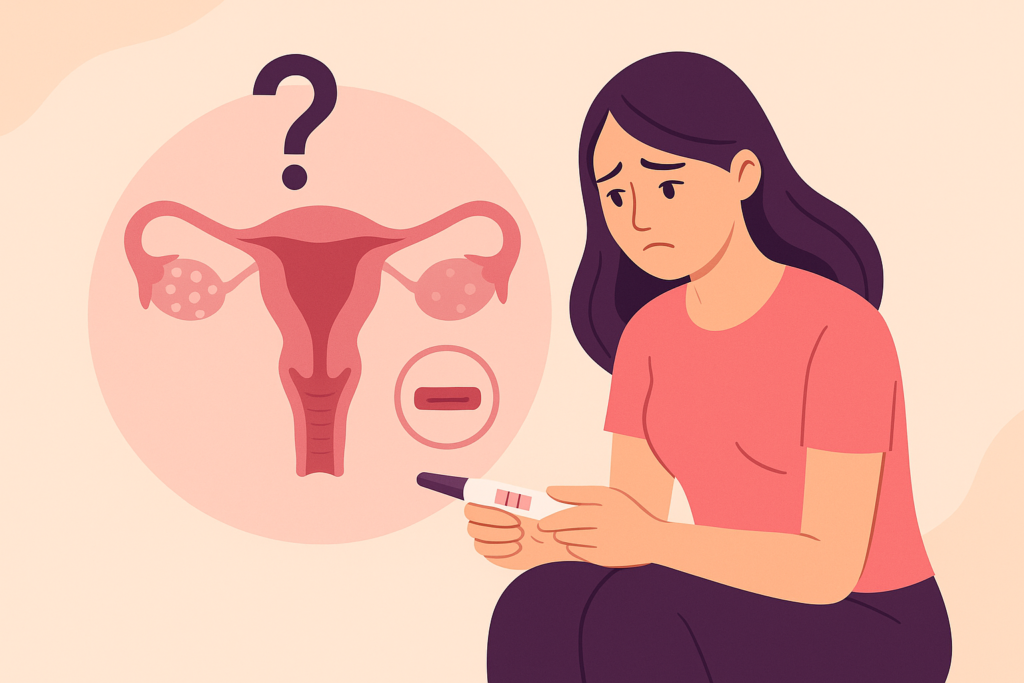This blog explains how PCOS affects fertility, from irregular ovulation to related health challenges, and explores ways to improve reproductive outcomes. With early diagnosis, fertility tests, and tailored treatment, women with PCOS can still achieve healthy pregnancies.
Introduction
For many women, starting a family is a dream filled with hope and excitement. Yet, conditions like Polycystic Ovary Syndrome (PCOS) can create unexpected roadblocks on that journey. PCOS affects nearly one in ten women of reproductive age and is one of the most common causes of fertility problems worldwide. While it may sound overwhelming, understanding the connection between PCOS and fertility is the first step in finding the right path forward. With the right knowledge, timely support, and appropriate medical care, women with PCOS can still have successful pregnancies and achieve their goals of motherhood.
What is PCOS?
Polycystic Ovary Syndrome, commonly known as PCOS, is a hormonal condition that impacts how a woman’s ovaries function. It is characterized by three main features: irregular menstrual cycles, high levels of androgens (male hormones), and the presence of multiple small cysts on the ovaries. While not every woman with PCOS experiences all of these symptoms, the condition can significantly affect ovulation, making conception more challenging.
PCOS is not just a reproductive concern; it also impacts metabolic health, increasing the risk of weight gain, insulin resistance, and type 2 diabetes. This close link between hormonal imbalance and fertility makes it important for women to be proactive in recognizing the signs and seeking guidance.
How PCOS Affects Fertility
The main reason PCOS interferes with fertility is due to irregular ovulation. For conception to occur naturally, an egg must be released during the menstrual cycle. In PCOS, hormonal imbalances often prevent ovulation or cause it to happen infrequently, reducing the chances of pregnancy.
Additionally, excess levels of insulin and androgens can disrupt the natural hormonal signals that regulate the reproductive system. Even if ovulation occurs, the quality of eggs or the uterine environment may be affected, leading to further complications. This is why women with PCOS often find it harder to predict their fertile days and may struggle to conceive without medical assistance.
Recognizing the Signs of PCOS and Fertility Concerns
PCOS can show itself in a variety of ways, and some signs may directly point toward fertility challenges. Common symptoms include:
- Irregular or missed periods
- Difficulty predicting ovulation signs
- Weight gain or difficulty losing weight
- Excess facial or body hair
- Thinning scalp hair
- Acne or oily skin
While these symptoms vary from woman to woman, the key concern for fertility is the irregularity of ovulation. Women trying to conceive should pay close attention to their cycles and watch for any abnormalities. If periods are inconsistent, or if it’s difficult to track ovulation, it may be time to consider professional evaluation.
Fertility Challenges Associated with PCOS
PCOS does not mean infertility, but it can make the process of getting pregnant longer and more complicated. Some of the main fertility challenges include:
- Irregular Ovulation – Without predictable ovulation, it becomes difficult to identify the best time for conception.
- Poor Egg Quality – Hormonal imbalances may impact egg development and quality.
- Increased Miscarriage Risk – Studies show women with PCOS may face a higher risk of miscarriage, often linked to insulin resistance or hormonal irregularities.
- Other Health Conditions – Associated issues like obesity, insulin resistance, and thyroid dysfunction may further impact fertility.
Despite these challenges, many women with PCOS go on to have healthy pregnancies with the right treatment approach and lifestyle adjustments.
Fertility Tests for Women with PCOS
For women struggling with conception, early assessment is crucial. Undergoing fertility tests helps identify whether ovulation is occurring and evaluates the overall reproductive health. Some of the common fertility tests recommended for women with PCOS include:
- Blood tests to check hormone levels
- Ultrasound scans to look for ovarian cysts and assess follicle development
- Ovulation tracking to determine if eggs are being released
- Tests for insulin resistance and thyroid function
These investigations provide a clearer picture of fertility status and help doctors recommend tailored treatments, ranging from lifestyle modifications to medications or assisted reproductive techniques.
Managing PCOS for Better Fertility Outcomes
The encouraging news is that PCOS can be managed effectively, and fertility can often be improved through a combination of medical and lifestyle strategies. Some common approaches include:
- Lifestyle Changes – Maintaining a healthy weight, eating a balanced diet, and exercising regularly can significantly improve hormonal balance and ovulation.
- Medications – Doctors may prescribe medications that stimulate ovulation or regulate menstrual cycles.
- Insulin Management – For women with insulin resistance, certain medications can help reduce blood sugar levels and improve fertility outcomes.
- Assisted Reproductive Techniques (ART) – In some cases, treatments like IVF (In Vitro Fertilization) may be recommended to enhance the chances of conception.
These strategies are not one-size-fits-all, so individualized care is essential. With consistent medical guidance and proactive self-care, many women with PCOS successfully overcome fertility challenges.
When to Seek Medical Advice
If you have been trying to conceive for more than six months without success and suspect PCOS may be the cause, seeking medical advice is the best next step. Early diagnosis not only helps improve the chances of pregnancy but also allows for better management of long-term health risks associated with PCOS.
Women should also seek professional help if they experience irregular cycles, lack of ovulation, or severe symptoms that interfere with daily life. Remember, fertility treatment is most effective when started early, so timely intervention is key.
Conclusion
Living with PCOS can feel overwhelming, especially when fertility is a priority. However, with the right information, proactive steps, and proper medical guidance, women with PCOS can still achieve their dreams of motherhood. The key lies in recognizing the signs early, undergoing necessary fertility evaluations, and committing to treatment and lifestyle changes that support reproductive health.
If PCOS is affecting your fertility journey, remember that hope is not lost. Advances in fertility care, combined with personalized support, can open the door to parenthood and empower you to take control of your reproductive future.
For expert guidance and comprehensive care in addressing PCOS and fertility, you can connect with Well Women Clinic. With a team of experienced Private gynecologist in St John’s Wood, advanced diagnostic tools, and personalized treatment plans, the clinic is dedicated to supporting women at every stage of their reproductive journey, helping them achieve better health and successful pregnancies.





